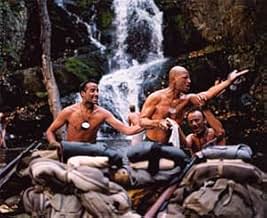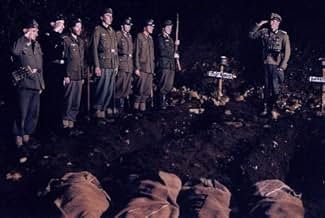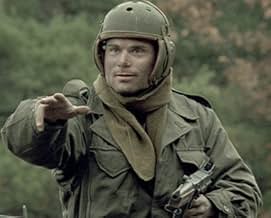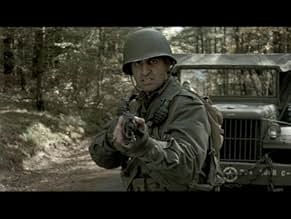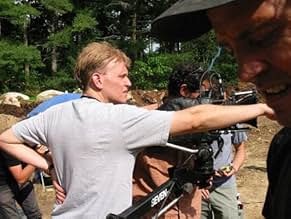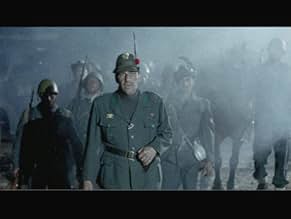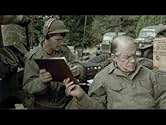Adicionar um enredo no seu idiomaThe story of ordinary men during WWII as seen from three different points of View.The story of ordinary men during WWII as seen from three different points of View.The story of ordinary men during WWII as seen from three different points of View.
- Prêmios
- 4 vitórias no total
Matthew Black
- Sgt. Hoakes
- (as Mathew Black)
Achim Buchner
- Franz
- (as Achim Beuchner)
- Direção
- Roteiristas
- Elenco e equipe completos
- Produção, bilheteria e muito mais no IMDbPro
Enredo
Você sabia?
- ConexõesEdited into Last Letters from Monte Rosa (2010)
Avaliação em destaque
I've a lot of respect for what American director Ari Taub is at least trying in his 2004 film set during World War II, entitled The Fallen. Where directors such as Michael Bay have, in the past, been granted huge sums of money only to go on and totally miss the mark in capturing that of what warfare is; does and represents in the form of Pearl Harbor, is terrifying. Likewise, other recent films have disappointedly used the sub-genre of war as a backdrop of spectacle to unfold cheap, familiar and dreary self discovery tales, as seen in James Cameron's Avatar, that aren't particularly interesting nor smart. Given this, it is difficult not to muster up at least an ounce of knowing for those such as Taub and The Fallen, whom are trying to explore ideas and get a proper film, about something, followed through with. It's unfortunate then, that the The Fallen ends up as uninteresting and detached as it does; a plodding and dreary feature that mostly drags for all of it's little-over-an-hour-and-a-half runtime as it strives to explore the viewpoints of a handful of soldiers amongst various factions in Second World War Italy.
The key in what the film wants to do ironically lies in its own inability to properly distinguish character from character or troop from troop. The two writers, Nick Day and Caio Ribeiro, and as a consequence the film itself, are more preoccupied with the notion of entire squads of soldiers or collections of people representative of respective ideologies battling it out on the front-line of a war. The film, particularly through it's tag-line which reads: "There are three sides to every story: ours, theirs, and the truth." is about the universal struggle with life, death and everything else all troops on the battle field share as they fight and strive for each of their respective victories more than it is an exploration of the damaging physical or psychological effects more famous examples of war films from recent decades have portrayed.
The foundations of this idea are fair enough, the result is a mostly wavy and unfocused piece which makes its point fairly quickly and covers most of its bases aptly enough when doing so, but too sporadically to really immerse us. The approach additionally denies the audience a chance to map onto an individual character around which the events play out, instead opting to cover German; Italian and American troops within the rural woodlands of Italy as the proverbial net closes in on those on the wrong side towards the end of The War. We're provided with some brief introductions of each of the three parties, the Germans occupying very grey, dishevelled and desperate quarters; the toll of the war etched all over the faces and coming out in the tone of their voices. Later, a lone American trooper jogs through a local village to a large manor house guarded by plain clothed, gun wielding Italians whom stop him and question him. The American keeps his cool at gun point and gets done whatever job he was there for; his isolation from the rest of his troops and individualism in the scene displaying an ability to stay calm and get even the toughest of missions done under threat. Then comes the time to provide us with an Italian perspective, a less than glamorous depiction of Italians as exhibitionists making a racket in a natural spring with the film generally subscribing to displaying them as caricatures throughout, especially disappointing given what has been established as a film all about breaking down boundaries and creating an equal playing field to all involved.
Out on the front-line amidst the gun fire and shrapnel is Charlie Company, of the United states Army, whom are running low on supplies. A platoon of American soldiers, including the aforementioned calm head and a more psychotic soldier whom appears to be channeling Andy Serkis' Private Quinn of 2002's Deathwatch, have been rejected leave and are instead charged with delivering supplies to the front-line that'll make the crucial difference and win them the fight: all half a dozen or so small wooden boxes of it. After the truck they're meant to deliver it all in breaks down, their plight manifests into a trawling across the country side, aid in-tow. This provides their plight with a very sub-Private Ryan feel about proceedings, the film granting us a series of sequences that see the troops caught up in exchanges and various altercations or scenarios with what could or could not be the enemy. Some of which include the running into a suspicious farmyard building and the uncovering of a machine gun emplacement plus trench, each supposedly acting as the catalysts for the troops to garner first hand experience of the front. In short, it's a little patchy and mostly an uninteresting adventure; the film not really being about plot, but more-so the universal thematics; with whatever story in there not being explored nor necessarily told particularly well enough to arouse interest.
One moment does get the blood pumping, one fleeting moment does show that there is indeed power to be had somewhere in the material and it sees Italian soldiers and renegade, anti-establishment Italian soldiers come face to face in a clearing as a standoff occurs; an instance that is well directed and is accompanied by a real sense of both threat and peril. But these moments, while interesting in their brief examining of how fighting on the front morally affects those involved, are too few and far in-between; a moment in which Taub's direction sears through only to have us frustratingly realise not much else is off this level when it seemingly could have been. The film is sporadic, even discombobulated; and with little-to-no discernible narrative to elevate the material above a series of interactions and scenarios of various factions strung together, decidedly disappointing.
The key in what the film wants to do ironically lies in its own inability to properly distinguish character from character or troop from troop. The two writers, Nick Day and Caio Ribeiro, and as a consequence the film itself, are more preoccupied with the notion of entire squads of soldiers or collections of people representative of respective ideologies battling it out on the front-line of a war. The film, particularly through it's tag-line which reads: "There are three sides to every story: ours, theirs, and the truth." is about the universal struggle with life, death and everything else all troops on the battle field share as they fight and strive for each of their respective victories more than it is an exploration of the damaging physical or psychological effects more famous examples of war films from recent decades have portrayed.
The foundations of this idea are fair enough, the result is a mostly wavy and unfocused piece which makes its point fairly quickly and covers most of its bases aptly enough when doing so, but too sporadically to really immerse us. The approach additionally denies the audience a chance to map onto an individual character around which the events play out, instead opting to cover German; Italian and American troops within the rural woodlands of Italy as the proverbial net closes in on those on the wrong side towards the end of The War. We're provided with some brief introductions of each of the three parties, the Germans occupying very grey, dishevelled and desperate quarters; the toll of the war etched all over the faces and coming out in the tone of their voices. Later, a lone American trooper jogs through a local village to a large manor house guarded by plain clothed, gun wielding Italians whom stop him and question him. The American keeps his cool at gun point and gets done whatever job he was there for; his isolation from the rest of his troops and individualism in the scene displaying an ability to stay calm and get even the toughest of missions done under threat. Then comes the time to provide us with an Italian perspective, a less than glamorous depiction of Italians as exhibitionists making a racket in a natural spring with the film generally subscribing to displaying them as caricatures throughout, especially disappointing given what has been established as a film all about breaking down boundaries and creating an equal playing field to all involved.
Out on the front-line amidst the gun fire and shrapnel is Charlie Company, of the United states Army, whom are running low on supplies. A platoon of American soldiers, including the aforementioned calm head and a more psychotic soldier whom appears to be channeling Andy Serkis' Private Quinn of 2002's Deathwatch, have been rejected leave and are instead charged with delivering supplies to the front-line that'll make the crucial difference and win them the fight: all half a dozen or so small wooden boxes of it. After the truck they're meant to deliver it all in breaks down, their plight manifests into a trawling across the country side, aid in-tow. This provides their plight with a very sub-Private Ryan feel about proceedings, the film granting us a series of sequences that see the troops caught up in exchanges and various altercations or scenarios with what could or could not be the enemy. Some of which include the running into a suspicious farmyard building and the uncovering of a machine gun emplacement plus trench, each supposedly acting as the catalysts for the troops to garner first hand experience of the front. In short, it's a little patchy and mostly an uninteresting adventure; the film not really being about plot, but more-so the universal thematics; with whatever story in there not being explored nor necessarily told particularly well enough to arouse interest.
One moment does get the blood pumping, one fleeting moment does show that there is indeed power to be had somewhere in the material and it sees Italian soldiers and renegade, anti-establishment Italian soldiers come face to face in a clearing as a standoff occurs; an instance that is well directed and is accompanied by a real sense of both threat and peril. But these moments, while interesting in their brief examining of how fighting on the front morally affects those involved, are too few and far in-between; a moment in which Taub's direction sears through only to have us frustratingly realise not much else is off this level when it seemingly could have been. The film is sporadic, even discombobulated; and with little-to-no discernible narrative to elevate the material above a series of interactions and scenarios of various factions strung together, decidedly disappointing.
- johnnyboyz
- 25 de set. de 2010
- Link permanente
Principais escolhas
Faça login para avaliar e ver a lista de recomendações personalizadas
Detalhes
- Data de lançamento
- Países de origem
- Central de atendimento oficial
- Idiomas
- Também conhecido como
- Días de sangre y fuego
- Locações de filme
- Empresa de produção
- Consulte mais créditos da empresa na IMDbPro
Bilheteria
- Orçamento
- US$ 600.000 (estimativa)
- Faturamento bruto mundial
- US$ 88.245
- Tempo de duração1 hora 52 minutos
- Cor
- Proporção
- 2.35 : 1
Contribua para esta página
Sugerir uma alteração ou adicionar conteúdo ausente

Principal brecha
By what name was The Fallen (2004) officially released in Canada in English?
Responda
